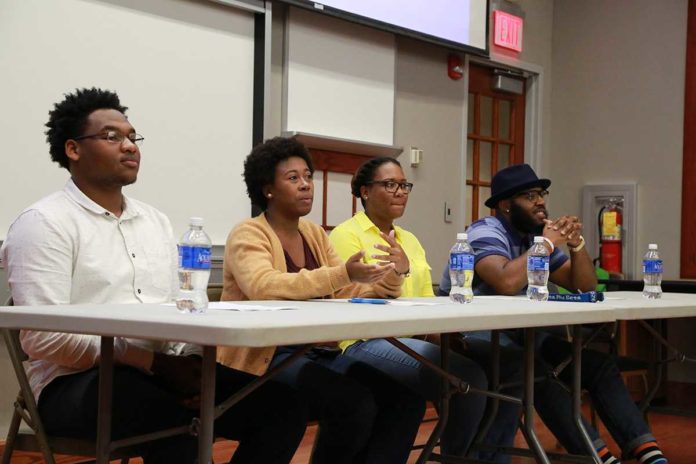A panel of speakers organized by Slippery Rock University’s Black Action Society (BAS) spoke on Tuesday about overcoming racial barriers and the importance of diversified leadership on campus.
The panel was comprised of four speakers, President of BAS, Yonshalae Powell, Treasurer of Men of Distinction, Mack Bean, President of Zeta Phi Beta sorority, Nahja Kittrell- Watson and leader in the First Year Transition Series Mentoring Program, Dwayne Anderson.
The four speakers were asked a series of questions that covered topics such as their background, experiences at the university regarding race and the importance of having diversity in leadership positions on campus. The speakers were given a platform to share their ideas and stories with nearly 40 students.
The panel started off by the speakers stating their individual background and explaining to the audience how they personally identify. Through these preliminary questions, the audience was to gain an understanding of the kinds of people the speakers were when they first stepped onto the university’s campus as either a freshman or a transfer student. The rest of the event focused on each member’s experiences as a minority on campus, and how their experiences have shaped them into the people they are today.
When asked about the existence of racial injustices at Slippery Rock, all of the panelists agreed that they have never experienced injustice per se, but rather negative encounters that often stemmed from a lack of knowledge on the other party’s end.
Treasurer of Men of Distinction, Bean explained that negative instances are caused mainly because people didn’t know what they were doing wrong, rather than having malicious intent.
Powell continued off of Bean’s point by telling the audience that “it’s been a teachable moment since the day I got here.”
A particular set of questions asked the speakers about how they overcame a lack of diversity on campus, where 86 percent of the student body population identifies as white or Caucasian. Kittrell-Watson said that many African American students feel the need to “prove” themselves in the classroom and work ten times harder than their peers in order to secure leadership positions.
Anderson also told the audience members that “no one can create a plan on their own,” and that cooperation between all members of an organization, regardless of race, is of utmost importance when planning an event. All of the panelists agreed that standing up for yourself, getting your opinions heard and accounted for and having the support of students and faculty is critical in order to become a successful black leader on campus.
One of the final questions directed toward the speakers was what their greatest obstacle as a black leader at Slippery Rock was and how they overcame it. The common theme in their answers was that perspective, and the lack thereof, regarding different social issues was their biggest obstacle.
“Students of other races may lack the ability to see other perspectives, thus putting black students in an uncomfortable situation that can make them feel even more underrepresented,” Powell said. “We hope that this panel gave students some perspective and eliminated any misunderstandings.”
Bean also brought up the fact that learning how to differentiate between being undermined because of race or because of ability was challenging, and that bringing diversity into various organizations on campus was a challenge.
Anderson closed the panel by explaining that “no one can control your life and impact your decisions,” which is advice that Slippery Rock students of any race can implement in their own lives.








